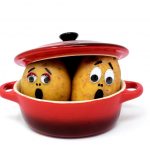Are Foods the Key to Your Moods? (Part 3) by Joan Kent, PhD
Are Foods the Key to Your Moods? (Part 3)
By Joan Kent, PhD
How do your carbs stack up? Do you eat the Right Ones?
Let’s start with leafy green vegetables. Do you eat enough? Enough would be 3 to 5 cups per day, every day. But how do they affect your moods?
Leafy vegetables contain folate. A diet deficient in folate can result in low serotonin production, which potentially causes depression.
The solution? Build big salads with “serious” greens (kale, spinach, arugula, chard and the like). Not iceberg lettuce! Eat these Serious Salads every day. (And plenty of other vegetables, too.)
What About the Wrong Carbs?
Too many wrong carbs – starchy or sweet ones – will trigger high insulin. Some people release extra insulin when they eat those types of carbs. They’re carbohydrate sensitive. High insulin actually changes the chemical balance of the brain.
For example, a high-carb diet can make you insulin resistant. This is not well known. We typically hear that insulin resistance results from overweight. But it can also be caused by diet.
How Does That Affect Your Mood?
Insulin action is necessary for serotonin production. So insulin resistance can reduce serotonin production, leading to depression or other rotten moods.
When you eat carbs, emphasize vegetables, lentils, beans, rice, or root vegetables – like yams, turnips or parsnips. These are preferable to pastas and breads, which may trigger higher insulin. Research has shown that, in general, wheat tends to promote insulin resistance to a greater degree than other starchy carbs do.
Always keep sugar to a minimum – or eliminate it.
Do You Drink Alcohol Frequently?
Regular use of alcohol may cause – or exaggerate – low brain serotonin. Alcohol does that in a couple of ways. It can cause malabsorption of folate. It also actively destroys vitamin B6.
Folate and B6 are both needed for serotonin production. And B6 is needed for norepinephrine and dopamine, as well.
Drinking alcohol frequently can result in depression and other mood issues, due to low levels of these 3 important brain chemicals.
And There’s More
Alcohol can also cause reactive hypoglycemia – low blood glucose following alcohol consumption. Reactive hypoglycemia results from the high insulin that alcohol triggers. High insulin may cause glucose to drop quickly and quite low.
Reactive hypoglycemia is linked with mood disorders: depression, irritability, outbursts, or temper displays. To keep your moods even, drink alcohol in moderation, if at all.
Finally, low serotonin often triggers cravings, especially for carbs. To keep serotonin levels adequate, limit alcohol. Drink less often and have fewer drinks at a time.
There’s much more to say about bad moods and foods. For one thing, bad moods bring on cravings, typically for junky carbs. Cravings are also triggered by PMS or stress. But that’s a topic for another post.
Putting It All Together
If your diet is high in white flour or sugar, OR if it’s low in protein, good fats, complex starches, or veggies, OR if you drink alcohol frequently … try these suggestions to improve your mood and increase your energy.
- Eat lean protein throughout the day: fish, shrimp, eggs, chicken, or unsweetened protein powder.
- Eat lots of vegetables throughout the day, including leafy greens.
- At lunchtime, avoid or limit starchy and sweet carbs.
- Select complex carbs – quinoa, lentils, turnips, squash – instead of white flour products.
- Include some healthful fats in each meal or snack.
- Limit your alcohol consumption.
If you follow these guidelines, you may find that your moods improve and your food cravings diminish – along with the urge to overeat!
I’m passionate about food and brain chemistry and would love to help you use foods to attain your optimal mood, peak health and energy, and more. Just visit http://www.LastResortNutrition.com and grab your free Empowered Eating Consult!



